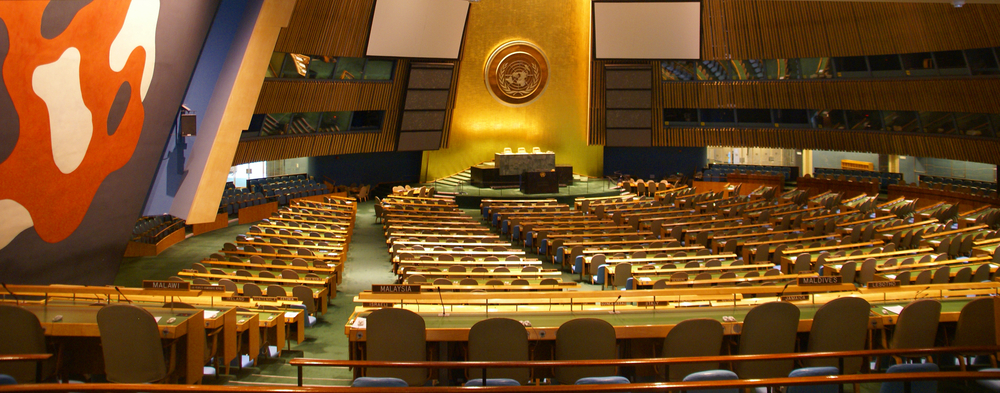








The Australia/Israel & Jewish Affairs Council (AIJAC) has condemned Australia's vote to upgrade the status of the 'State of Palestine' at the UN General Assembly. AIJAC Executive Director Dr. Colin Rubenstein described the vote as 'profoundly disappointing' and 'totally contrary to our long-standing bipartisan national commitment to a negotiated two-state peace between Israel and the Palestinians.' Rubenstein criticized the recognition of 'Palestine' as a major national achievement made possible by Hamas' wave of violence, which rewards its violent, terrorist methods. He also stated that the vote contradicts the language of the UN Charter and damages Australia's national credibility. Rubenstein called on the Government to reconsider its policy approach toward Israel, the Palestinians, and the current war in Gaza [a98dbb90].
The ongoing Israel-Gaza war has reignited discussions about the viability of a two-state solution in the Israeli-Palestinian conflict. Secretary-General António Guterres of the United Nations (UN) has emphasized the importance of the UN committee on the rights of Palestinians in achieving peace in the Middle East. Guterres stated that only a two-state solution can ensure a just and lasting peace and stability in the region [6bbb4ad6].
Guterres expressed deep concern over the violence and suffering in Gaza, calling for rapid humanitarian access and a ceasefire. He highlighted the collapsing humanitarian system in Gaza and the importance of the United Nations Relief and Works Agency for Palestine Refugees in the Near East (UNRWA)'s work. Guterres called for urgent steps to de-escalate the situation in the occupied West Bank and emphasized the need for tangible progress towards a two-state solution based on 1967 lines [6bbb4ad6].
In a recent analysis, Jeffrey D. Sachs and Sybil Fares argue that the UN can play a pivotal role in ending the Middle East conflict by welcoming Palestine as its 194th member state. They point out that a recent UN General Assembly resolution demands an end to Israel's 1967 occupation and supports the two-state solution, with the US being the only remaining veto against Palestinian statehood. The authors outline seven measures for peace, including a ceasefire, recognition of Palestine's sovereignty, and regional diplomatic normalization, asserting that the chance for peace is now [c1569319].
The recent conflict between Hamas and Israel has resulted in massive bloodshed and a humanitarian crisis. Hamas militants broke through the wall separating Israel and Gaza, leading to increased violence and casualties. The article mentions the calls for a two-state solution by U.S. President Joe Biden and the Union for the Mediterranean, recognizing the importance of finding a peaceful resolution to the conflict.
One of the major challenges to the two-state solution is the significant increase in Israeli settlements in the West Bank, East Jerusalem, and the Golan Heights. These settlements make it increasingly difficult to establish a contiguous Palestinian state, as they fragment the Palestinian territories and hinder the prospects of a viable and independent Palestinian state. The article also highlights the rise in attacks by Israeli settlers on Palestinians, further exacerbating tensions and undermining the prospects for a two-state solution.
Despite these challenges, the article emphasizes the importance of continuing to strive for a two-state solution. It acknowledges the complexities involved but argues that it remains the most viable path towards peace in the Israeli-Palestinian conflict. The article concludes by calling for a halt to the expansion of settlements and a renewed commitment to meaningful negotiations that address the core issues at the heart of the conflict.
Former State Department diplomat Aaron David Miller argues that Hamas does not have any interest in a two-state solution [ae155f27]. Miller, who has spent decades negotiating for peace in the Middle East, states that Hamas rejects the idea of a two-state solution. He highlights the impact of the killing of Gazans waiting for food on the ceasefire talks. This perspective adds to the complexity of the debate surrounding the creation of a Palestinian state and the ongoing conflict between Israel and Hamas.
In an article by Layla Moran, she highlights the need for immediate action in Gaza, following the barbarous attacks by Hamas on October 7th, 2023. Over 30,000 Palestinians, mostly women and children, have been killed, and 1.7 million people have been displaced. Moran calls for an immediate bilateral ceasefire and a longer-term political solution based on a two-state solution with 1967 borders. She also emphasizes the need to address the issue of illegal settlements in the West Bank, which undermine the viability of a two-state solution. Moran urges the international community to take concrete actions, including sanctions, to oppose the settlements and support peace efforts. The Liberal Democrats have called for an audit of assets in the UK belonging to individuals supporting the settlements. Moran concludes by stating that the Liberal Democrats will continue to push for a two-state solution as the only route to peace [29f50be8].
In light of these differing perspectives, the debate surrounding the creation of a Palestinian state remains complex and contentious. While some argue for the importance of a two-state solution as the most viable path towards peace, others caution against pushing for a Palestinian state without addressing the underlying issues and potential risks involved.
An article by Angela Xu from Modern Diplomacy proposes an alternative approach to the two-state solution in the Israeli-Palestinian conflict. Xu suggests resettling the people of Gaza in the West Bank in exchange for the permanent withdrawal of Israeli settlements and the establishment of a sovereign Palestinian state. The author argues that this resettlement plan, supported by a security arrangement overseen by Jordan, Israel, the US, and other multilateral partners, could provide a realistic pathway to the two-state solution. The article acknowledges the challenges and complexities of the Israeli-Palestinian conflict and emphasizes the need for a just and lasting peace in the Middle East. It discusses the interests of Israel, the Palestinian people, and the United States, and argues that a two-state solution is necessary for self-government and autonomy for Palestinians. The author suggests that the current setup of Gaza and the West Bank is not viable and proposes resettlement as a solution. The article also highlights the importance of international determination and support for the establishment and success of a new Palestinian state. It concludes by discussing the risks of overreach and the need for a delicate balance of interests in the region.
The ongoing Israel-Gaza war has brought the search for peace to the forefront. An opinion piece by Phyllis Levinson and Marjorie Kravitz in The Washington Post discusses the current state of the conflict and the need for a commitment to peace. The authors mention that there has been a two-state solution since 2005 when Israel withdrew completely from Gaza in exchange for peace. However, the current two-state solution has been deadly for Israel, with approximately 10,000 rockets fired by Hamas into Israel since the Oct. 7 massacre of Israelis. The article also highlights the impact of the Israeli bombing campaign on Gaza's economy, potentially strengthening Hamas. It mentions the possibility of Hamas being on Russian President Vladimir Putin's payroll. The war has also drawn attention away from Ukraine, with some Trump supporters objecting to funding for Ukraine due to the war demands of Israel. The article emphasizes the need for a commitment to peace and a requirement for both sides to publicly accept Israel's right to exist within international boundaries. It also mentions the BDS movement as a way for individuals to live out their values and hold governments and companies accountable. The article concludes by highlighting the importance of investing in education instead of attack tunnels in Gaza.
The article from New Pittsburgh Courier discusses the possibility of a two-state solution for Israelis and Palestinians, drawing parallels to the end of apartheid in South Africa. The current Israeli government rejects the creation of a Palestinian state, but the unprecedented scale of violence in Israel and Gaza is creating urgency to find a solution. The fall of apartheid in South Africa was attributed to international pressure and economic boycotts. South Africa's involvement in a border war with Namibia and Angola also played a role. The article suggests that the ongoing war in Gaza and the displacement of its population may lead to significant change in the region. Pressure is growing internationally for a cease-fire and a two-state solution, with the United Nations and the U.S. supporting the latter. There are barriers and divisions to realizing a two-state solution, but there is a growing consensus that it is the only acceptable outcome [e7951e0f].
Former judge Sir Konrad Schiemann discusses the limitations of 'justice' in reconciling bitter enemies. He highlights the importance of constructing a political order that enables competing sides to live in peace, rather than insisting on one side overcoming the other. The creation of the European Community after World War II was a successful attempt at accustoming opponents to working together and finding common solutions. Schiemann acknowledges the importance of justice but emphasizes the need to consider all humans as equal, regardless of background [91d6d9ef].
Despite the differing views presented in these articles, it is clear that the debate surrounding the creation of a Palestinian state is multifaceted and complex. The Israeli-Palestinian conflict continues to be a deeply entrenched issue with no easy solutions. The international community must continue to engage in meaningful dialogue and negotiations to address the core issues and work towards a lasting peace in the region.
Separating the wheat from the chaff in the Israeli-Palestinian conflict is crucial for resolving the conflict and preparing for the future. The fog of war, deep-seated emotions, and an information war make this separation challenging. Key questions involve the feasibility of a two-state solution, the conduct of Israel and Hamas during the war, and the potential for circumventing Hamas in the future. The article argues that looking at the geographical spread of Israeli settlements on the West Bank alone is misleading, and that major concentrations of the settler population should be considered. The feasibility of a two-state solution adds urgency to the question of whether Hamas can be bypassed in negotiations. The article also highlights the hypocrisy of both Israel and Hamas in their treatment of innocent civilians. The failure to separate fact from fiction and confront uncomfortable truths has contributed to the current conflict.
[6bbb4ad6]
[01d3bab0]
[e7951e0f]
[ae155f27]
[29f50be8]
[549c1611]
[91d6d9ef]
[a98dbb90]
[c1569319]